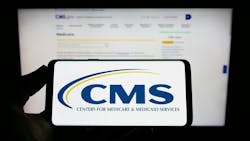The Centers for Medicare & Medicaid Services (CMS) has finalized a rule focused on streamlining prior authorization of medical services. Stakeholders concur that the new rule is a step in the right direction, while some say the rule doesn’t address all current concerns.
Receiving prior authorization from payers before providing services to patients has been a major concern for healthcare providers. According to them, prior authorization is often used in a manner that results in critical patient care delays and adds preventable costs to the healthcare system.
The rule sets requirements for Medicare Advantage (MA) organizations, Medicaid and the Children’s Health Insurance Program (CHIP), fee-for-service (FFS) programs, Medicaid managed care plans, CHIP managed care entities, and issuers of Qualified Health Plans (QHPs) offered on the Federally-Facilitated Exchanges (FFEs), to improve the electronic exchange of health information and prior authorization processes for medical items and services.
Key provisions:
- Requirement (not including QHP issuers on the FFEs) to send prior authorization decisions within 72 hours for expedited (i.e., urgent) requests and seven calendar days for standard (i.e., non-urgent) requests for medical items and services.
- Include a specific reason for denying a prior authorization request.
- Implementation of a FHIR-based Prior Authorization application programming interface (API). This facilitates a more efficient electronic prior authorization process between providers and payers by automating the end-to-end prior authorization process. Per CMS, impacted payers have until compliance dates, generally beginning January 1, 2027, to meet the API development and enhancement requirements. The exact compliance dates vary by the type of payer.
- Add information about prior authorizations (excluding those for drugs) to the data available via the Patient Access API. Annual metrics about Patient Access API usage are to be reported to CMS.
- Maintain a Provider Access API to share patient data with in-network providers.
- Maintain a Payer-to-Payer API to make available claims and encounter data (excluding provider remittances and enrollee cost-sharing information), data classes and data elements in the USCDI, and information about certain prior authorizations (excluding those for drugs).
- Implement a Prior Authorization API populated with its list of covered items and services, which can identify documentation requirements for prior authorization approval and support a prior authorization request and response.
- Requirement to publicly report prior authorization metrics, like the metrics Medicare FFS already makes available.
- Electronic Prior Authorization measure for eligible clinicians under the Merit-based Incentive Payment System (MIPS) Promoting Interoperability performance category and eligible hospitals and critical access hospitals (CAHs) under the Medicare Promoting Interoperability Program.
“Increasing efficiency and enabling health care data to flow freely and securely between patients, providers, and payers and streamlining prior authorization processes supports better health outcomes and a better health care experience for all,” said CMS Administrator Chiquita Brooks-LaSure in a statement.
“CMS’s new requirements for streamlining the prior authorization process, including requiring a 72-hour turnaround for urgent care requests, and a seven-day turnaround for standard care requests, are appropriate and overdue changes, and we salute the agency for making them,” said Susan Dentzer, APG’s President and CEO, in a statement.
However, Steven P. Furr, M.D., FAAFP, President of AAFP, said in a statement, “While this final rule is a concrete step toward reducing the glaring administrative burden physicians face, we need congressional action to cement this vital progress. As such, family physicians urge Congress to swiftly pass the Improving Seniors Timely Access to Care Act, which will streamline and standardize prior authorization under the Medicare Advantage program and protect beneficiaries from unnecessary delays in care. This will ensure physicians can do what they do best: treating patients.”
Soumi Saha, Senior Vice President, Government Affairs, Premier Inc., expressed appreciation for the final rule, which addresses inefficiencies in the manual prior authorization process but also voiced disappointment for unaddressed issues. In a statement, Saha said, “While Premier appreciates CMS’ commitment to codifying required deadlines for prior authorization decisions by payers, postponing care for potentially up to seven days is still untenable when a patient’s health is on the line. Instead of making patients and providers play a dangerous waiting game, Premier maintains that CMS should require payers to deliver responses within 72 calendar hours for standard, non-urgent services and within 24 calendar hours for urgent services. Premier is also disappointed by the final rule’s lack of acknowledgement that a pathway to real-time prior authorization exists. CMS missed a valuable opportunity to develop incentives to move payers and providers closer to real-time processes using innovative technologies. With record labor shortages, inflation and other demands in the healthcare sector, it is more critical than ever that providers are able to leverage technology to create efficiencies. Premier will continue to push Congress to act on issues that CMS failed to address in the final rule.”
AHIP released the following statement, “We appreciate CMS's announcement of enforcement discretion that will permit plans to use one standard, rather than mixing and matching, to reduce costs and speed implementation. However, we must remember that the CMS rule is only half the picture; the Office of the Coordinator for Health Information Technology (ONC) should swiftly require vendors to build electronic prior authorization capabilities into the electronic health record so that providers can do their part, or plans will build a bridge to nowhere.”
CMS stated that the new policies will reduce the burden on patients, providers, and payers, resulting in approximately $15 billion of estimated savings over ten years.


